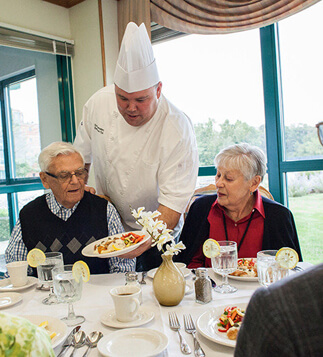Celiac Crusader Tackles Challenges of Moving into Residential Living
Mike Rose, long-time celiac advocate, shares his experiences – and best advice – for securing celiac-safe Residential Retirement Accommodation.
“I retired shortly before being diagnosed as a Celiac and volunteered for 12 years as a member at large in the Victoria Chapter of the Canadian Celiac Association. I served 5 years as Chapter Chair and two as Regional Director for British Columbia, on the National Board.
Listen to Mike Rose’s interview on A Canadian Celiac Podcast!
When my father was diagnosed with celiac disease before me, in early 1990, we were told that 1 in 15000 were Celiac in North America. Now as we know, a better estimate is 1 in a hundred.
My father lived alone in an apartment and my wife (also a Celiac) used to cook extra servings and freeze them and we would take over a weeks supply at a time. My father ultimately moved into the Gorge Hospital, where he had volunteered for many years, while my mother was there. They provided him with a gluten-free diet that he tolerated, despite some issues.
While still associated with the Chapter and active after retirement, I arranged discussions with dietitians at two hospitals in Victoria about the gluten-free diet. That helped me in my frequent, short stays there. The food is good and the short list of options is OK until a long stay is needed. When my wife was in hospital for a 3-month stay, I frequently took in a change of food for her.
- Now after another 20 odd years, gluten-free food is available everywhere until you have to move into a Retirement accommodation or Care.
As my wife and I gradually realized that our large, almost empty home was too much work, we decided to look into a Residential Home where all our meals would be supplied. We had visited friends in 2 or 3 facilities prior to our search and had good experiences, albeit with mainly with fruit dishes and salads.
- Then the fun began.
In looking into the various options for Retirement and Care homes, I discovered that gluten-free food is not a given in most locations. Phoning and occasionally visiting Private Residential Accommodation (not run by the Provincial Government and not subsidized,) I spoke with chefs at several facilities.
- I found the lack of knowledge of celiac disease was rampant. Some said they did not cater to Celiacs; several would want us to sign a waiver if we entered their accommodation to protect them from litigation.
In checking with Social Workers in Saanich and other Municipalities, I discovered that they were not fully aware of the dietary issues at a level that would make it easy to decide on a location.
As a result of my experience with the Chapter, where we spent a lot of volunteer hours educating doctors, hospitals and grocery stores and a couple of restaurants, I was convinced that the only way to succeed would be to educate – after moving into a location.
We have been fortunate to have moved into the Victorian on Feltham in Victoria. 1 The staff are prepared to modify their purchases and selections so that they can satisfy our needs. We prepare our own breakfasts mainly because we do not want to get up too early.
Because of Covid we alternate between eating in the dining room and having a single selection delivered to our rooms. As we are just about to have our vaccinations, we hope that soon we will have all meals in the dining room with more selection.
Best advice:
- If you are looking for such accommodation, I would suggest starting your search well in advance, develop a relationship with the Marketing staff and take advantage of visits and a few free meals.
- Be prepared to ask aggressive questions.
- Then be prepared to educate, advise and be patient for a while until the staff adjust to their new requirements.”
1 The Marketing Manager at the Victorian on Feltham was notified in advance about the publication of this article.














